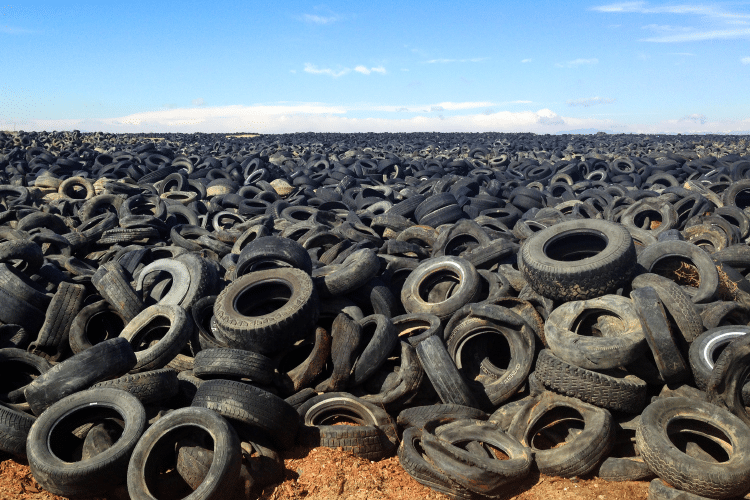When most drivers think about tyres, the focus is usually on performance, grip, or cost. What often goes unnoticed is the environmental footprint that tyres leave behind, from the moment they are manufactured to the time they are disposed of. In today’s world, where sustainability is becoming a global priority, it is crucial to understand the hidden impacts of tyres on the environment and how we can reduce them.
The Environmental Cost of Tyre Production
Tyre manufacturing is a resource-intensive process. Natural rubber, synthetic rubber, petroleum-based products, steel, and textiles are key materials, all of which have their own environmental consequences. Extracting natural rubber often leads to deforestation in tropical regions, while synthetic rubber is derived from fossil fuels, contributing to carbon emissions.
Moreover, the production process itself is energy-heavy. Factories that cure and mould tyres release greenhouse gases, which add to global warming. According to industry estimates, manufacturing a single passenger car tyre produces approximately 27 kilograms of CO2 emissions. Multiply this by the millions of tyres made annually, and the scale of the issue becomes clearer.
Microplastics and Tyre Dust
One of the most overlooked environmental issues is tyre wear. As tyres roll on roads, tiny particles, known as tyre dust, break off. These particles are made of rubber, fillers, and chemicals. Unlike organic matter, they do not degrade easily, and many of them end up in waterways, soil, and even the air we breathe.
Recent studies show that tyre wear contributes significantly to global microplastic pollution, sometimes even more than single-use plastics. Once in the environment, these particles are ingested by marine life, eventually entering the food chain and affecting human health.
End-of-Life Tyre Disposal Challenges
What happens when a tyre reaches the end of its life is another environmental concern. Landfilling used tyres is problematic because they are non-biodegradable, take up vast amounts of space, and can trap gases that make them rise to the surface. They also become breeding grounds for pests such as mosquitoes.
Burning tyres, another disposal method, is even worse. While it reduces volume, it releases toxic chemicals, including dioxins and heavy metals, into the atmosphere, which are harmful to both the environment and human health.
Recycling and Repurposing Efforts
Thankfully, there are more sustainable options for dealing with end-of-life tyres. Recycling programmes around the world are turning old tyres into useful materials. Shredded tyres can be used for playground surfaces, running tracks, or even in road construction. Pyrolysis, a process that breaks down tyres into oil, gas, and char, is being explored as a way to recover valuable resources while reducing waste.
Repurposing also plays a key role. Creative uses, such as converting tyres into furniture, art pieces, or construction materials, help reduce the environmental load while promoting circular economy principles.
Driving Habits and Environmental Impact
It is not just the production and disposal of tyres that harm the environment, but also how we use them. Aggressive driving, poor maintenance, and overloading vehicles cause tyres to wear faster, increasing the frequency of replacement and generating more waste.
Maintaining proper tyre pressure, rotating tyres regularly, and choosing fuel-efficient models are simple steps drivers can take to reduce environmental impact. By extending the lifespan of tyres, you minimise the demand for new ones, which in turn reduces resource consumption and emissions.
Innovations in Green Tyre Technology
The good news is that the tyre industry is innovating rapidly. Manufacturers are now developing eco-friendly tyres designed to lower rolling resistance, improve fuel efficiency, and last longer. Some are experimenting with alternative materials like dandelion rubber, rice husks, and even algae-based compounds to reduce reliance on petroleum.
Smart tyre technology is also playing its part. AI-powered sensors can monitor tyre performance in real-time, allowing drivers to maintain optimal conditions, prevent early wear, and extend tyre life. These innovations not only benefit the environment but also save money for consumers in the long run.
The Role of Policy and Regulation
Governments and international organisations are stepping in to address tyre-related environmental issues. Regulations that mandate proper disposal and recycling, incentives for companies to develop eco-friendly tyres, and awareness campaigns are all helping to shift the industry toward sustainability.
For example, the European Union has set strict standards for tyre labelling, including fuel efficiency and noise emissions, encouraging consumers to choose greener options. Similar initiatives are gradually being adopted worldwide.
How Drivers Can Make a Difference
As drivers, we often underestimate the power of our choices. Opting for high-quality, durable tyres, maintaining them properly, and disposing of them responsibly can collectively have a significant impact. Supporting tyre brands that invest in green technology also sends a message to the industry that sustainability matters.
Even small lifestyle changes, like carpooling or reducing unnecessary trips, can indirectly reduce tyre wear and the demand for replacements. Being conscious of how tyres affect the environment is the first step towards meaningful change.
Conclusion
Tyres may seem like ordinary components of a vehicle, but their environmental impact is anything but ordinary. From production to disposal, the hidden consequences are far-reaching, affecting air, water, and ecosystems. Thankfully, advancements in technology, recycling, and consumer awareness are paving the way for more sustainable practices.
For drivers in the UAE looking to balance performance, safety, and sustainability, making informed tyre choices is more important than ever. Whether you are selecting eco-friendly models, maintaining your current set, or seeking responsible disposal options, every step counts towards a greener future. If you are exploring sustainable options and reliable service providers, a trusted tyre shop Dubai like PitStop Arabia that can guide you in finding solutions that match both your driving needs and environmental values.



